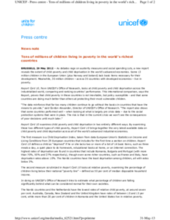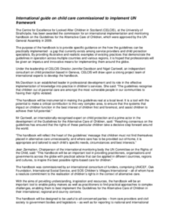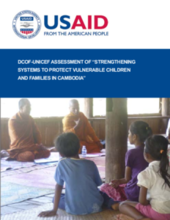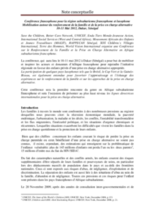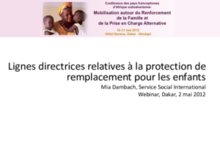Demographic Data
|
Sources: World Bank, UNICEF, UNDP HDR 2015, DHS 2013 |
Displaying 12971 - 12980 of 14557
The Ministry of Gender Equality and Child Welfare (MGECW) of Namibia released the 2012 Foster Care Standards and Guidelines which are aimed to guide social workers and other service providers in recruiting, assessing, training, matching, supporting, supervising and monitoring foster care services. The Foster Care Guidelines assist in translating the Standards into day-to-day practices. These Standards and Guidelines with accompanying training manuals were prepared to strengthen supported family-based care for vulnerable and marginalized children.
As debates rage on austerity measures and social spending cuts, a new report reveals the extent of child poverty and child deprivation in the world’s advanced economies. Some 13 million children in the European Union (plus Norway and Iceland) lack basic items necessary for their development. Meanwhile, 30 million children – across 35 countries with developed economies – live in poverty.
The Centre for Excellence for Looked After Children in Scotland (CELCIS), at the University of Strathclyde, has been awarded the commission for an international implementation and monitoring handbook on the Guidelines for the Alternative Care of Children, which were approved by the UN General Assembly in 2009.The purpose of the handbook is to provide specific guidance on the how the guidelines can be practically implemented - a gap that currently exists among service providers and child protection specialists.
This report describes the outcomes of the joint DCOF/UNICEF visit to Cambodia to assess a three-year, DCOF-funded project on Strengthening Systems to Protect Vulnerable Children and Families in Cambodia.
Ceci est une présentation à la Conférence sur le Renforcement de la Famille et la Prise en Charge Alternative en Afrique subsaharienne francophone en Mai 2012 en Dakar, Sénégal.
La conférence, qui aura lieu le 10-11 mai 2012 à Dakar (Sénégal) a pour but de mobiliser et inspirer les acteurs et donateurs d’Afrique francophone pour rejoindre l’initiative régionale en faveur des enfants privés d’une prise e
This paper presents findings from the first-ever study of kinship care in the UK using census micro data.
Study tracing impact of FXB International's community-driven “FXB-Village” model on graduates of the program. The models is a structured program of household support and economic strengthening designed to empower particularly vulnerable families to escape extreme poverty and ensure the enduring wellbeing of the children in their care.
On May 2, 2012, in preparation of the Family Strengthening and Alternative Care Conference for Francophone Sub-Saharan Africa in Dakar, Senegal, BCN and the regional planning committee convened experts and practitioners to present and discuss the efforts to implement the Guidelines for the Alternative Care in the region. Watch this video for presentations, country level experience from Togo, and discussions on the pressing issues facing implementation in the region.
Ceci est une présentation à la Conférence sur le Renforcement de la Famille et la Prise en Charge Alternative en Afrique subsaharienne francophone en Mai 2012 en Dakar, Sénégal.


